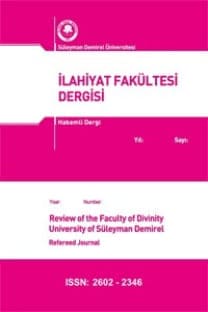ARİSTOTELES'İN METAFİZİK'İNDE İLAHİYATIN YERİ YA DA FELSEFENİN VE DİNİN ORTAK ALANI İLAHİYAT
Bu kısa makalede, Aristoteles'in Metafizik adlı eserinin örnekliğinden hareketle ilahiyat konuları ile felsefe arasındaki ilişkiye dikkat çekilecektir. Aristoteles'in iddiasına göre ilk nedenleri bilmeden ne varlığı, ne de varlığa gelişi anlamak mümkündür. Çünkü bir şeyin varlığa gelmesi için onun bir maddesinin, bir formunun, bir amacının ve bir yaratıcısının olması şarttır. Bu, en küçük bir yaratma etkinliği için şart olduğu gibi bütün bir evrenin yaratılması için de gereklidir. İşte bu nedenleri bilmek en yüksek bilgi alanı olan ilahiyat ilmi ile mümkündür. Aristoteles'in ifadesi ile felsefenin hem ilk hem de nihai gayesi bu ilahiyat ilminin konularını incelemektir. Bunun için ilahi olan konuları araştıran ilimin adı ilk felsefe enstrümanı ise hikmettir, bilgeliktir. Bu inceleme ile bir düşünür ister bir ilahi tasarımı kabul etsin ister inkar etsin, isterse de agnostik bir sonuca varsın, fark etmez, yapılan zihni etkinliğin hasıl ettiği ürün ilahiyattır. Bu yüzden ilahiyat ilmi ile felsefe arasında kopmaz bir bağ vardır
Anahtar Kelimeler:
Aristoteles, İlahiyat, Tanrı, İlk Neden, İlk Felsefe, Hikmet.
THE PLACE OF THEOLOGY IN ARISTOTLE'S METAPHYSICS OR THEOLOGY, AS THE COMMON AREA BETWEEN PHILOSOPHY AND RELIGION
In this short article, the relationship between the issues of theology and philosophy will be pointed out, from the perspective of Aristotle’s Metaphysics. According to Aristotle’s argument, without knowing the initial causes, it is possible to understand neither the existence nor coming into existence. The reason is, for a thing come into existence it has got to have substance, a form, a purpose and a creator. This is a requirement for the minimal-scale activity of creation, as it is for the creation of the whole universe. And it is possible to know these causes via theology, which is the most comprehensive field of knowledge. As in Aristotle’s phrase, both the very first and final intention of philosophy is to investigate the subjects of theology. Therefore, the name of the discipline, which studies the aforementioned subjects, is first philosophy and its instruments are wisdom and sagacity. No matter a philosopher accepts or denies the idea of divine projection, or comes to an agnostic conclusion, the outcome of any mental activity on this point is theology. Hence, there is an unbreakable tie between philosophy and theology.
Keywords:
Aristotle, Theology, Deity, The First Cause, The Preliminary Philosophy, Wisdom,
___
- Aristoteles, Metafizik, çev. Ahmet Arslan, Sosyal Yayınları, İstanbul, 2010.
- Cevizci, Ahmet, Felsefe Tarihi, Say Yayınları, İstanbul, 2009.
- Dictionary of Beliefs and Religions, Rosemary Goring, Chambers: Edinburgh, New York, 1992.
- Gökberk, Macit, Felsefe Tarihi, Remzi Kitabevi, İstanbul, 1982.
- Jones, W.T., Klasik Düşünce Batı Felsefesi Tarihi, cilt:1, çeviren: Hakkı Hünler, Paradigma Yayıncılık, İstanbul, 2006.
- Peters, Francis E., Antik Yunan Felsefesi Terimler Sözlüğü, çeviren: Hakkı Hünler, Paradigma Yayıncılık, İstanbul, 2004.
- Reese, Willam L., Dictionary of PhilosophyandReligion, New Jersey: HumanitiesPress, HarvesterPress: Sussex, 1980.
- Yayın Aralığı: Yılda 2 Sayı
- Başlangıç: 1994
- Yayıncı: Süleyman Demirel Üniversitesi
